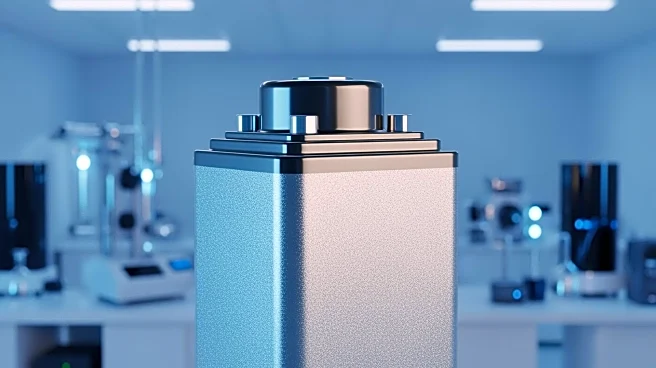What's Happening?
Anaphite, a Bristol-based startup, has developed a dry electrode coating technology that promises to significantly reduce the carbon footprint associated with electric vehicle (EV) battery production.
Traditional wet coating processes, which are used in 99% of current battery manufacturing, require large, energy-intensive ovens to dry the electrode material. Anaphite's dry coating process eliminates the need for these ovens, thereby reducing energy consumption and emissions. According to an independent analysis by lifecycle consultancy Minviro, Anaphite's technology can cut CO2 emissions by 3.57kg per kWh of cell capacity. If applied globally, this could result in a reduction of approximately seven million tonnes of CO2 annually. The feasibility study, funded by a UK government grant under the Automotive Transformation Fund, confirms the environmental benefits of Anaphite's technology.
Why It's Important?
The development of Anaphite's dry electrode coating technology is significant for the EV industry, which is under pressure to reduce its environmental impact. By lowering the carbon footprint of battery production, Anaphite's technology supports the sustainability goals of EV manufacturers and aligns with upcoming EU battery regulations. These regulations will require all industrial batteries over 2kWh to have a Battery Passport by 2027, ensuring compliance with carbon footprint standards. The technology not only offers environmental benefits but also potential cost reductions, making it an attractive option for manufacturers seeking to improve their sustainability credentials.
What's Next?
Anaphite's technology is poised to play a crucial role in the future of EV battery production. As the industry moves towards more sustainable practices, manufacturers may increasingly adopt dry coating processes to meet regulatory requirements and consumer demand for greener products. The successful implementation of Anaphite's technology could lead to widespread changes in manufacturing processes, potentially influencing policy decisions and industry standards. Continued collaboration with lifecycle consultancies like Minviro will be essential to ensure rigorous assessment and quantifiable results, further validating the technology's benefits.
Beyond the Headlines
The shift from wet to dry electrode coating processes represents a broader trend towards sustainability in manufacturing. This transition could have long-term implications for the industry, including changes in factory design and energy usage. As manufacturers seek to reduce their carbon footprints, innovations like Anaphite's technology may drive further advancements in green manufacturing techniques, potentially influencing other sectors beyond automotive.










